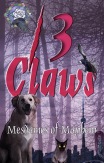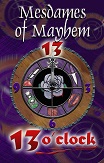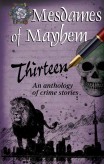Therese Greenwood is an award-winning author of short stories and non-fiction. Her crime fiction has appeared many times in leading mystery publication, Ellery Queen Magazine. Enjoy her collected work in Kill as You Go (Coffin Hop Press).
In 2019 her memoir, What You Take with You (Wayfarer Press), about her family’s escape from the Fort McMurray wildfire was a finalist for the Alberta Book Publishing Awards.
Therese grew up on Wolfe Island near Kingston, Ontario, an area steeped in history. Her story, “The Iron Princess”, draws on Kingston’s notorious history of rum-running across frozen Lake Ontario to the USA.
THE IRON PRINCESS
BY
THERESE GREENWOOD
Norman tucked his hair under the brim of his hat. Some people thought red hair was a bad mark, but he liked standing out in a crowd except, of course, when he was robbing someone. He tied the blue spotted bandana around his neck, ready to slide over his mouth and nose, and thought how the classic outlaw disguise stood the test of time.
He had practiced it in front of the cracked shaving mirror at the boarding house, until even his mother wouldn’t recognize him. It had been five years since he’d last seen her, so she might not recognize him even if he were standing in broad daylight on her front stoop on Poulett Street. He recalled her standing and crying with the other women on the crowded platform at Union Station, when he boarded the troop train with the rest of the Canadian Expeditionary Force conscripts, headed for the ship that was headed for Flanders.
Now Norman was waiting for a different train. It had been a long trip from his mother’s Cabbagetown home to a Flanders trench to a rumrunner’s whistle-stop halfway between Montreal and Detroit. The old brick train station squatted at the end of a single-lane dirt road, its platform facing Lake Ontario and a wooden dock where coal had once been delivered from the American city across the channel. Now, the main cargo was whiskey from distilleries in Montreal, off-loaded to rumrunners in fast boats for the trip into the States. The station also took delivery of the monthly cash payload from Detroit, which was why Norman and his two partners were driving down the dirt road.
Lester Tremblay was a large man who filled up most of the front seat of Dutch Voss’s six-cylinder MacLaughlin Buick, leaving Norman pressed against the passenger door. They had ambushed the bootlegger’s car and left the two heavies who did the money train pickup in a ditch beside the Third Line Road. Lester, who had served in a mechanized cavalry unit, was crazy about engines and would have killed just to get his hands on the getaway car, a model so favored by bootleggers it was nicknamed a Whiskey Six. In the back seat, Wyoming McMullen, an old man of almost 40, reclined against the leather like Warren G. Harding waiting for a parade to start.
“Now don’t get cute, Norm,” Wyoming said, as Lester pulled the car in beside the station. “Stick to the plan.”
“It’s my plan,” Norman said.
“You stole the plan,” Wyoming said.
“I only steal the best,” Norman said. “You know me.”
“I do,” Wyoming said. “Let’s run it down again.”
“Time check,” Norman said, and the three men raised their wrists to synchronize timepieces stolen from a watchmaker in Napanee.
“It’s zero-seven-thirty,” Norman said. “Train comes in at zero-eight-hundred.”
“Zero-seven-thirty-two, I make sure the car is pointed down the escape route,” Lester said. “I stay behind the wheel, engine running, and watch the road till the train arrives.”
“I walk up the line to switch the signal to green, then return to a position on the railway platform wearing the cypher badge on my right arm,” Wyoming said, wrapping the bandana they had taken from one of the heavies around his upper arm. Luckily, the cloth was red, so the bloodstains didn’t show.
“I enter the railway station and capture the telegraph man,” Norman said, putting his hand on the pistol he had taken at Valenciennes from a German officer who didn’t need it anymore.
It took no time to run down the remainder of a plan so simple it was a work of art. As soon as the train pulled in, Lester would look after the engineer while Wyoming knocked—three long and two short—for the guards to open the mail car. After the guards were dealt with, Wyoming and Lester would unload the cash, while Norman forced the telegrapher to send a coded message that all was well. Then they’d make their getaway in the Whiskey Six. By the time Dutch Voss figured out his money train had been hit, they would be across the border and halfway to Florida.
Norman loved the plan, which had been presented to him by the Penitentiary Branch of His Majesty’s Canadian Department of Justice.
Norman was not much of a reader, more of a doer, but he ended up working in the prison library. The padre had put in a good word for him because of his war service and because he knew Norman’s mother back on Poulett Street.
Norman discovered he liked stories with action, particularly the dime-novel westerns of John Ross Cobb. He was particularly taken with a ripping yarn called The Iron Princess, named for a train carrying a gold rush payload. John Ross Cobb was a clever man, and his train robbery scheme made sense. The outlaws robbing the Iron Princess overlooked just one thing—they forgot to cut the telegraph lines. A wire was sent to the next town and when the gang rode in, they were cut to pieces in a hail of bullets.
Norman wished he had lived in the age of outlaws, with open skies, fast horses, and lawmen few and far between. Hiring on as a gunslinger. Robbing trains and banks. Moving on to the next town with saloons, dance hall girls, cheap liquor, and poker games. What a time to be a man.
He might have felt differently if, after the Armistice, he’d found a clerking job like his mother wanted and settled down with a schoolmarm who canned preserves from her own garden, made him go to church on Sundays, and smelled of lily of the valley. But there were no jobs, especially not for an ex-soldier who had been trained for only one thing since he was 18 years old. He’d barely hung up his uniform before he found himself doing a bit of this and that for men his mother would have called “shady.”
He turned 21 in Kingston Penitentiary, where he made the acquaintance of Wyoming and Lester. After he gave the Iron Princess book to Wyoming, and after Wyoming read it to Lester, they agreed that, with what they’d learned from the army and the prison library, the government was practically begging them to become outlaws. All they needed was a money train.
Norman was first to get his Ticket of Leave. Jobs were even harder to find after you had been a guest in His Majesty’s Canadian prison system, so Dutch Voss was not surprised when Norman showed up looking for work. It wasn’t long before he was riding shotgun on the money train payload.
By the time Wyoming and Lester walked out of the joint, Norman had the lay of the land, all the signals and codes to make the train stop and open the armored mail car. It was like John Ross Cobb was writing them into a book.
“Stick to the plan,” Wyoming said. “No funny business.”
“I’m the only one who can be recognized,” Norman said. He reached into the back seat[EP2] and picked up a coil of rope stolen from the mercantile in Westport. He made a quick loop in one end, lasso-style, then pulled the coil over his head and across his chest, leaving both hands free. “Why would I risk my own skin?”
They got down to it, Norman walking up the four steps to the station platform, Lester turning around the car, and Wyoming heading down the tracks toward the signal switch.
Norman pulled the bandana over his nose and took out his pistol; then he opened the solid oak door and rushed in. He pointed the pistol where he expected to see the telegraph operator, a small man with tidy clothes and a green visor over his eyes as he sat before the telegraph key.
Instead, he saw a girl facing a gleaming telephone switchboard twice her size. Her back was to him, and she held up one finger on her left hand to show she knew someone had come in. She wore an operator’s headset over shiny brown hair cut in a bob that barely covered the back of her neck, and she was speaking French.
“Oui, d’accord,” she said, then swiveled her seat so she faced Norman and the gun. Her mouth formed a lovely O , like Clara Bow when she acted startled.
“Tabernac!” the girl said. She wore a white, short-sleeved shirt with a round collar that showed off a diamond pendant, a gold wristwatch on her left wrist, and no ring. She looked at Norman’s pistol with light brown eyes, a little furrow across her forehead.
“Stand up,” said Norman.
“Pardon?” she said.
Norman tipped up the barrel of the pistol, a gesture German-speaking soldiers had always understood. The girl pulled off her headset with a practiced move and laid it gently on the desk next to a candlestick telephone, so new that the brass shone. She raised both hands to check that her hair was not mussed, smoothing a wisp that stuck out behind her ear, no doubt out of habit but making Norman wonder about the softness of her short, shiny hair.
When she stood, Norman saw she was wearing wide-legged tan trousers and shiny black boots. Norman had never thought about women wearing boots and trousers, but had to admit that there might be something to it.
“Bun-joor, mad-mooz-ell,” Norman said. “Par-lay voo English?”
“Français,” she said, shaking her head.
Norman had learned some French after stealing his captain’s watch and doing 60 days in the stockade while the rest of his unit attacked machine guns at Hill 70. He got two meals a day, homecooked by the jailer’s wife, and a nice, dry cell he shared with a French-Canadian private who had broken a British officer’s nose. Now Norman could order bière or vin. He could ask the way to the train station, harder than he thought because the words for station and war, gare and guerre, sounded alike. Norman thought the station was implied, because in his experience war always found you, but Jean-Pierre told him the French found the mix-up comical. He also taught Norman a phrase to use with girls at French honky-tonks. It came in handy now.
“Vooz et sull?” he asked.
“Oui,” said the girl. “Je suis seule.”
Now he knew she was alone. Norman motioned for her to sit back down and lifted his finger to his lips in the universal sign for shush[EP5] . The girl sat and mimicked the hush sign back to him. Norman liked smart girls.
“If you scream, I have a man out changing the signal lamp and another in the car.” Norman pointed to the end of the platform and then at the west wall. “You don’t want them to come in.”
The girl had not taken her eyes from the gun since he walked in, and Norman supposed she was in shock. He had seen new recruits go quiet before their first battle. Once the whistle blew, the quiet ones either tore out of the trench like avenging angels or folded like a cheap suit. Norman kept his eyes and the pistol on the girl as he walked to the door, opened it to signal all clear to Lester, then shut and locked it.
“My name is John,” Norman said, pointing to his chest.
“Babette,” the girl said. “Je suis Babette.”
“Well, Babette,” Norman said, “this is a very interesting situation.”
The plan called for Norman to tie up the telegraph operator, who was supposed to be a wiry Signals Corps veteran who laid telegraph cable in no-man’s-land[EP6] at the Somme, and who had to stay alive long enough to send the coded message after the train stopped. But no John Ross Cobb outlaw hog-tied a woman, even one in trousers. Norman glanced at his watch. Fourteen minutes till the train arrived. He had to stick to the plan.
“I’m going to tie you up until the train pulls in,” Norman said. “I’ll loosen up your hands so you can telephone all clear[EP7] , then truss you up again before I take off with the boys.” John Ross Cobb could not have come up with a better plot twist.
Babette shifted her gaze from the gun to look directly into his eyes, and Norman hoped she was getting the gist. At least she hadn’t fainted or had hysterics. He pulled the coil of rope over his head with one hand and held it out so she could see the loop in the end. “To tie you up,” he said. He realized he was almost shouting, as if speaking louder made his words clear.
“Put your hands on the desk,” he said, miming the action. She put her hands on either side of the candlestick telephone and, as he walked up beside her, her eyes went back to the gun in his hand.
“Grab the rope,” he said, stretching out his arm so she could reach the dangling loop. He might be an outlaw, but he was no cowboy. John Ross Cobb’s heroes could toss a lasso 20 paces, but it would go a lot easier she draped the loop over herself.
“Pardon?” she said. She kept her hands on the desk, while releasing a burst of French that meant she didn’t understand, or that he was a stinking rat. Or both.
Norman looked at the switchboard panel, a jumble of cables, circuits, jacks, and toggle switches. He would never send the message without her, and they would never make it to the border if the bootlegger got wind something was up. Time was ticking. He stepped beside her, turning the pistol aside as he used his right hand to grasp the dangling end, and that was when the polished black boot kicked up between his legs.
Norman fell over a trousered leg, still clutching the pistol as pain raced through him like an electric current. His hat fell off as he hit the floor, and the girl bashed him on the head with the brass telephone, over and over until he dropped his weapon. When she snatched up the pistol, Norman smelled her perfume, which was not lily of the valley or any flower he knew. It smelled expensive and European. When he managed to sit up, the girl had drawn a bead on him with a surprisingly steady hand.
“Give me that gun, Babette,” he said. “Before you hurt someone.”
“I am going to hurt someone,” she answered in unaccented English, “and this is a good pistol for it. Mauser semiautomatic with eight rounds, which I expect you reloaded after dealing with Bob and Harry, who were supposed to arrive five minutes before you.”
“Eight bullets,” said Norman, “but there are 10 men outside.”
“There are two men outside,” said the girl. “One heading back from the signal switch, and one in the boss’s car. Enough rounds for everyone.”
“You are a girl with hidden depths, Babette,” Norman said. “Where did you learn about German pistols?”
“I was a Hello Girl in the war,” she said.
Norman raised his eyebrows, his pain-soaked brain wondering if that somehow explained the trousers.
“Not that kind of Hello Girl,” she said. “A female telephone operator, trained to operate a battlefield switchboard while speaking two languages. The army trained us as soldiers, but the newspapers called us Hello Girls.”
“There were no women soldiers in France,” Norman said. “I would have noticed that.”
“Not in the Canadian army,” she said. “United States Signal Corps. General Pershing himself taught me to shoot a pistol on the front line at Argonne. I suspect that’s when you got your hands on this Mauser, during the Hundred Days Offensive. Valenciennes, maybe? Judging by your age, I’d say you were conscripted around 1917.”
“Did General Pershing teach you where to kick a man?”
“That was my aunt,” she said. “Before I left for basic training.”
“One comrade in arms to another, let’s think about this,” Norman said. “My partners are hard men and it will be two against one. Let me go, and I’ll tell them you’re dead. Keep the gun, lock the door, and barricade yourself in here until we finish with the train.”
“The train isn’t coming,” she said.
“That can’t be, Babette,” said Norman said. “Everything is going to plan.”
“Except me,” she said. “I left the telephone line open after you came in.”
Norman looked at the switchboard to see a jack plugged into a slot and a cable leading into the operator headset lying on the desk, with the mouthpiece transmitter facing him.
“Say hello to Mr. Voss,” the girl said.
Tinny threats began shrieking from the earpieces, and a cold chill clutched Norman’s heart when he heard his name.
“When I turn around to see a masked man with a gun, I don’t need Jack Pershing to tell me what’s up,” Babette said, the pistol unwavering as she picked up the headset with her left hand. She did not slip it over her shiny hair; instead, she held the transmitter up to her mouth as she kept her eyes on Norman.
“Hello, Dutch. I am now armed and have one prisoner,” she said. “Building is secure. One armed man is heading back from the signal switch. Another is in your motor car on the building’s west side. Roger that. Line remaining open.”
“How does a girl like you end up in a place like this?” Norman said, as she put the headset back on the desk.
“Peacetime offers few prospects for female wire experts trained in bilingual battlefront operations,” she said. “Luckily, Mr. Voss recognizes what the modern woman has to offer.”
“Is your name really Babette?” Norman asked, as he pulled the bandana from his face.
“No,” said the girl. “Babette is a codeword for armed intruder.”
“What happens now?” Norman asked.
“Reinforcements,” the girl said.
Norman heard the roar of a large truck rattling like a tank down the dirt road. Over the clatter, he heard Lester give three short blasts on the horn and Wyoming’s leather soles pounding on the stones along the railroad track. A car door slammed, and tires spun in soft dirt. The first shots rang out as the Whiskey Six sped toward the enemy inbound on the single-lane road.
“A hail of bullets,” Norman said.
“You’re safe with me until the boss arrives,” the girl said.
“Then what?” Norman asked.
“Then? Goodbye.”




























